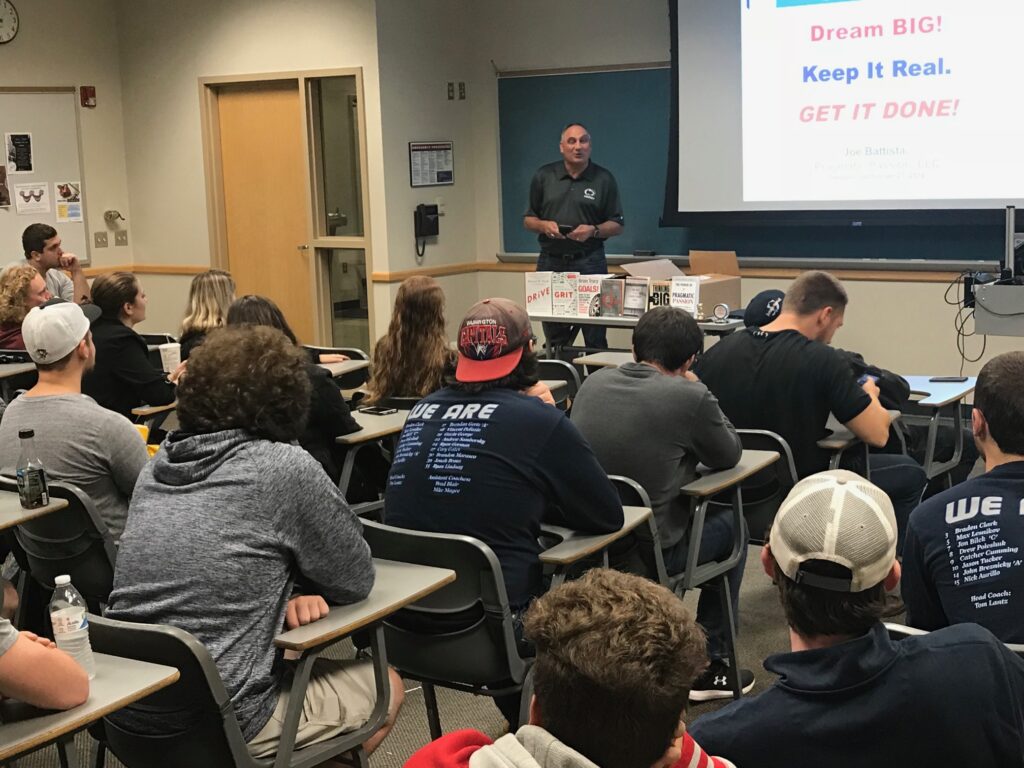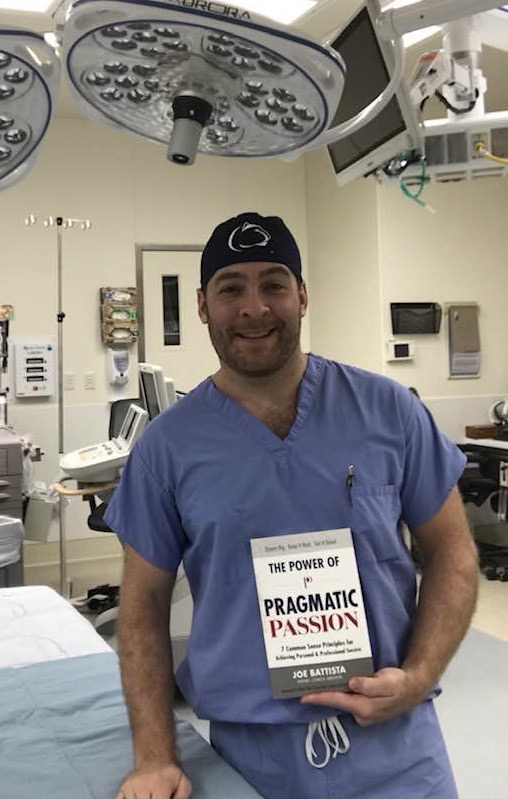Graduation is a time to celebrate but it can also be a time of tremendous stress as high school, technical school and college graduates all seek to answer, “What’s next?” It’s that time of the year when I remind young adults (and their parents) to take the time needed to develop great options and make informed decisions.
When I woke up this past Sunday morning, I received a T.A.G. (The Attitude of Gratitude) message that really made my day. It was from a former Penn State football player and family friend who I assisted in connecting with a business associate a few years ago.
“Thanks again Joe for passing my resume along. I’ve been fortunate to contribute to [The Company] over the last 3 years. I have relocated to a distributor for [The Company] in Southwest Florida. It is a great company that I am still lucky to be a part of. I’ll never forget your willingness to help. I hope you and the family are well. Best, Pat.”
There are several lessons to learn from this communication:
- Pat was totally qualified for the position for which he requested my assistance. He’d done the heavy lifting and that is why I was willing to help.
- Pat had also done his homework about the position he sought, so it was easy for me to be his advocate with the CEO of “The Company.”
- Pat took the time to thank me when he originally earned the position and after he earned his recent promotion.
- Most importantly, Pat had the courage to ask for help.
I have written about this subject several times in the past, so yes, this is my annual reminder to pull yourself up by the bootstraps and take charge of your life. If you are the parent, it’s time to be the mentor you are meant to be and challenge your child to develop options and make tough choices.
Radical Candor
Let me highlight that last statement. This is a time for graduates to be bold, to have courage and to get into the action habit. It’s their life and it’s time for them to take charge and to be held accountable to set themselves up for success. I get almost as frustrated as parents I work with when the response from students to “What do you want to do?” is a lazy and weak “I dunno,” complete with the deer-in-the-headlights facial expression. Equally disappointing is when the answer to “What interests you?” is “Nothing,” with a shrug of the shoulders.
It’s not about having the perfect job or career map; it’s about starting the journey with a positive step forward. The answers above are simply unacceptable, and it calls for some “tough love” from the adults in the room.
Yes, I said it. I am going to be that guy. Someone must! No more Mr. Nice Guy. I’ve tried to be subtle in the past, worried about hurting someone’s feelings. But too often I come across young adults and their parents who keep missing the target when it comes to post-secondary education and career decisions. Why? Because they will not sit down and have the hard conversations about preparing for the future.

Remember, you don’t have to have the exact answer to your career aspirations at 17, but you have a better chance to set yourself up for success if you have developed realistic options and create a plan to make it so. It means doing your research and homework. It means setting up appointments with guidance counselors and career coaches (if you have the resources).
Let’s continue to focus on the high school juniors and seniors for a moment. There are more resources available to you today than ever before in the form of personality trait assessments, career assessments, career search computer programs, specialists at your schools or experts for hire from the private sector. Heck, there are enough free resources on the internet that no one should say “I dunno” or “nothing” when asked about the future. You’re so young it’s almost impossible to make a lasting mistake if you do the appropriate research. If you change your mind or things go sideways, it’s OK. You simply must pivot and adjust.
The time to be subtle and worry about hurting someone’s feelings is over. I’m trying to help you folks! Your dreams (or your children’s) can come true. They must, however, be anchored in reality and based on facts. Winging it isn’t a plan and neither is hoping something will simply fall in your lap. Just doing what you love and following your passion isn’t always sound advice, but passion and practicality do not have to be mutually exclusive either. You can achieve both if you are playing the long game.
However, we adults must stop making it sound easy and as if you are entitled to find a career where you get paid to do what you love to do. It’s not. There are still plenty of starving artists, unemployed philosophy and history majors and video game playing phenoms that are 30 years old and still living at home.

Warning: Colleges Are Businesses.
In Chapter 6 of my book, I discuss the idea that college is not for everyone, at least not at 18. There are other ways to make a great living using your talents and skills that don’t require a four- year degree, at least not right out of high school.
“Our role is not to get students a job. It’s to educate them.” If you hear that from a college admissions officer, run away quickly!
“But college is a time to explore, to find yourself.” Maybe it was 40 years ago when it was much more affordable. It’s just not that simple anymore and there are always options if you do your research and ask the right questions.
Are we being too easy on kids? Are we so caught up in the mental health concerns that we won’t at least try some tough love? Why can’t we challenge them? Students and parents need to carve out time to research the best careers for the future.
If your kids won’t talk with you, at a minimum text them links to articles that appeal to their innermost common senses. I encourage parents to make appointments for them with experts at their schools or in the private sector. I speak from experience and tell the story in my book of taking my own son to both a clinical psychologist and an industrial psychologist to help him with anxiety issues and to narrow down his career interests. I don’t care if it might have embarrassed him at the time because we did it for his own good. It worked out perfectly. He excelled in high school, selected one of the four majors recommended by the experts based on his interests and aptitude and he begins his full-time job with the top medical technology company in the world this June.
My objective has always been to help high school students (and their parents) to avoid the disappointments and angst that come with making bad decisions due to a lack of information and having candid discussions to develop the best options and make more informed decisions.

Are you ready to have the tough conversation when your student wants to study a major with a low job placement? How many undergraduate family studies, religious studies and sport management graduates do we really need? I worked in the sports industry and it’s a grind. There are not a lot of jobs, the starting pay isn’t great, you will work long hours and there isn’t a lot of security in it.
But — and this is a big but — if you’re truly passionate, committed and willing to stay the course, any one of these majors can lead you to a lucrative career. It just may take a little more patience and perseverance, along with a little good fortune. If you are willing to give the whole ”I want to work in sports” thing a go, you should at least know that there are many ways to build a career you may have never considered. Doing what you love sounds great. But only if someone is willing to pay you for what you love to do.
“Joe why are you being so negative and bursting my kid’s dream?” I’m not. I am simply trying to keep it real. Dream Big. Keep It Real. Get It Done!
I’m simply asking you to use the data, common sense and tools to find a good fit and a good return on your investment. I will get an occasional response from someone who beat the odds and has a lucrative career in a major like art history or goes on to be a professional athlete. Awesome! But you are very likely the exception, and you are probably working for Lloyd’s of London or some other insurance company, or were a naturally gifted athlete to begin with. People will even send me columns about others who chose an obscure path and their dream came true. My response is usually something like, “Have you considered the column was newsworthy exactly because it’s such an outlier and infrequent occurrence?”
Don’t compare yourself to others who come from a totally different socioeconomic background either. Especially if you’re in the middle of the bell-shaped curve. Someone whose family has substantial financial resources can bail out the aspiring fashion designer grad who can’t find a job with a living wage. Others may come from low-income households and may have access to discounts, grants, scholarships and low interest loans. You must “do you” but you don’t have to go it alone.
Be bold and courageous and ask the hard questions. It will make it less hard to ask them later after the fact when you find yourself $100,000 in debt and without a job.
What’s next? It’s time to take charge of your life.



